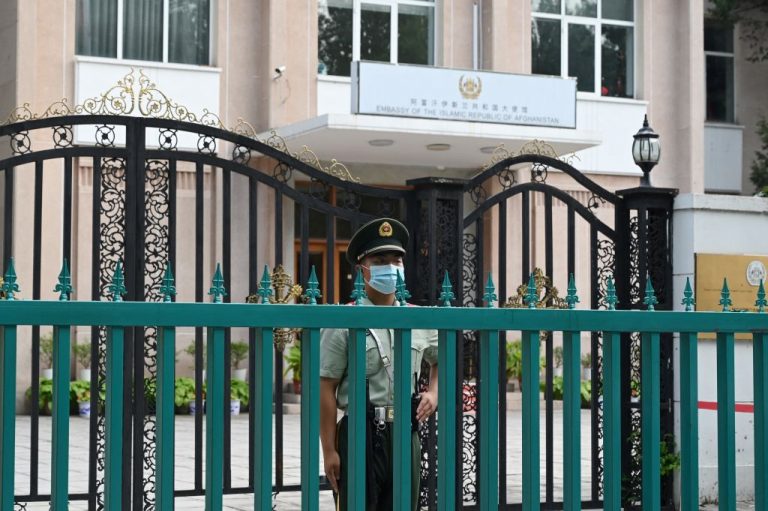Salih Hudayar, prime minister of the East Turkistan Government in Exile, recently stated that China is actively looking to cooperate with the Taliban. After the terror outfit took control of Afghanistan, communist China was one of the first countries that sought to legitimize its rule.
The East Turkistan Government in Exile is a democratically elected body that represents people from the western region of China, largely from Xinjiang, home to the Uyghur ethnic group. The Chinese communist government has been running a brainwashing campaign among Uyghurs, seeking to eradicate their culture. Since at least 2017, Beijing is believed to have established up to 1,200 internment camps. The survivors of these camps have accused the CCP of gang rape, torture, slavery, and forced organ harvesting.
In an interview with Breitbart, Hudayar said that China takes cooperating with the Taliban “very seriously.” Cooperation is critical to the safety and continuance of Beijing’s Belt and Road Initiative (BRI). The BRI is a trillion-dollar infrastructure plan that seeks to extend Chinese influence worldwide via ports, railways, and other similar projects.
Hudayar stated that China’s naval base construction at the Gwadar port in Balochistan, Pakistan, is aimed at extending the CCP’s presence in the Persian Gulf. In addition, an airport is also being constructed at Tashkurgan, East Turkestan, to fulfill this objective. Considering the radar stations Beijing set up in Maldives and other places, “it’s clear that China is spreading its net,” he says.
To ensure that the Taliban remains in power, it will be necessary to bring in funds to prevent the country from returning to a civil war. According to the Uyghur leader, communist China is the only country that will provide financial support to the Taliban.
Success
You are now signed up for our newsletter
Success
Check your email to complete sign up
“To remain in power, the Taliban needs to please the Afghan people and develop the country to a certain extent. It takes a lot of money, expertise, and strategy to achieve this goal,” Hudayar stated.
He also predicts that the Taliban will “never sever” ties with communist China even though Beijing is committing genocide against Uyghur Muslims. The Taliban has already stated that it won’t interfere with China’s “internal issues,” suggesting it will turn a blind eye to the persecution of Uyghurs. Hudayar also blames the existence of Uyghur jihadists under the Taliban on Beijing. He says that the Chinese regime wants these jihadists to exist so that they can keep portraying Uyghurs as potential terrorists.
“These jihadists will exist as long as China needs them and they will be disarmed overnight if China wishes. It’s important to note that these jihadists have long pledged allegiance to the Taliban and they have designated the Taliban as the ‘Emir (Commander) of Muslims’, so they must obey the Taliban,” Hudayar said. He added that the rise of the Taliban was a boon for the Chinese government and a threat to the world.
“‘We fear the Taliban will help China control our movements, or they will arrest us & hand us over to China.’ The Uyghur community in Afghanistan now face a double threat: the Taliban & China. The Gvt’s chronic miscalculation has left millions vulnerable,” tweeted Afzal Khan MP, UK Labour MP for Manchester Gorton.
The CCP and Taliban
Srikanth Kondapalli, professor in Chinese studies at Jawaharlal Nehru University in New Delhi, India, told The Epoch Times that the ties between the CCP and Taliban go way back to the 1970s. That’s when Beijing’s intelligence officials trained mujahideen fighters against the presence of the Soviet Union in the country. A former PLA deputy chief of general staff stated that communist China provided arms, including missiles and AK-47s, to the mujahideen in Xinjiang and nearby regions.
Just before the end of 2000, the United Nations Security Council proposed sanctioning the Taliban to force it to shut down Osama bin Laden’s terrorist training camps. However, China abstained from voting and even sent military personnel to support the Taliban after the U.S. began carrying out airstrikes.
“China’s ambassador to Pakistan engaged [Taliban leader] Mullah Omar with the proposal not to aid the Uyghurs, [in exchange for] protection at [the Security Council] for the Taliban. Post 9/11, China continued its links with the Taliban and its supporter the ISI of Pakistan, and articulated the view that the Kabul government should be broad-based,” Kondapalli said.
According to political analyst Bradley Jardine, the Taliban-CCP cooperation poses a major threat to Uyghurs in Afghanistan. Since the Taliban is now in control of government records, they can provide Beijing access to identification cards that can be used to capture Uyghurs in the country and deport them back to China.
“Historically, the Taliban have tried to move Uyghur populations in Afghanistan to monitor them… There are also cases of the Taliban deporting Uyghurs from the regions that they’ve controlled in Afghanistan,” Bradley Jardine told Radio Free Asia. Jardine is a scholar at the Kissinger Institute on China and the United States at the Wilson Center in Washington.
















